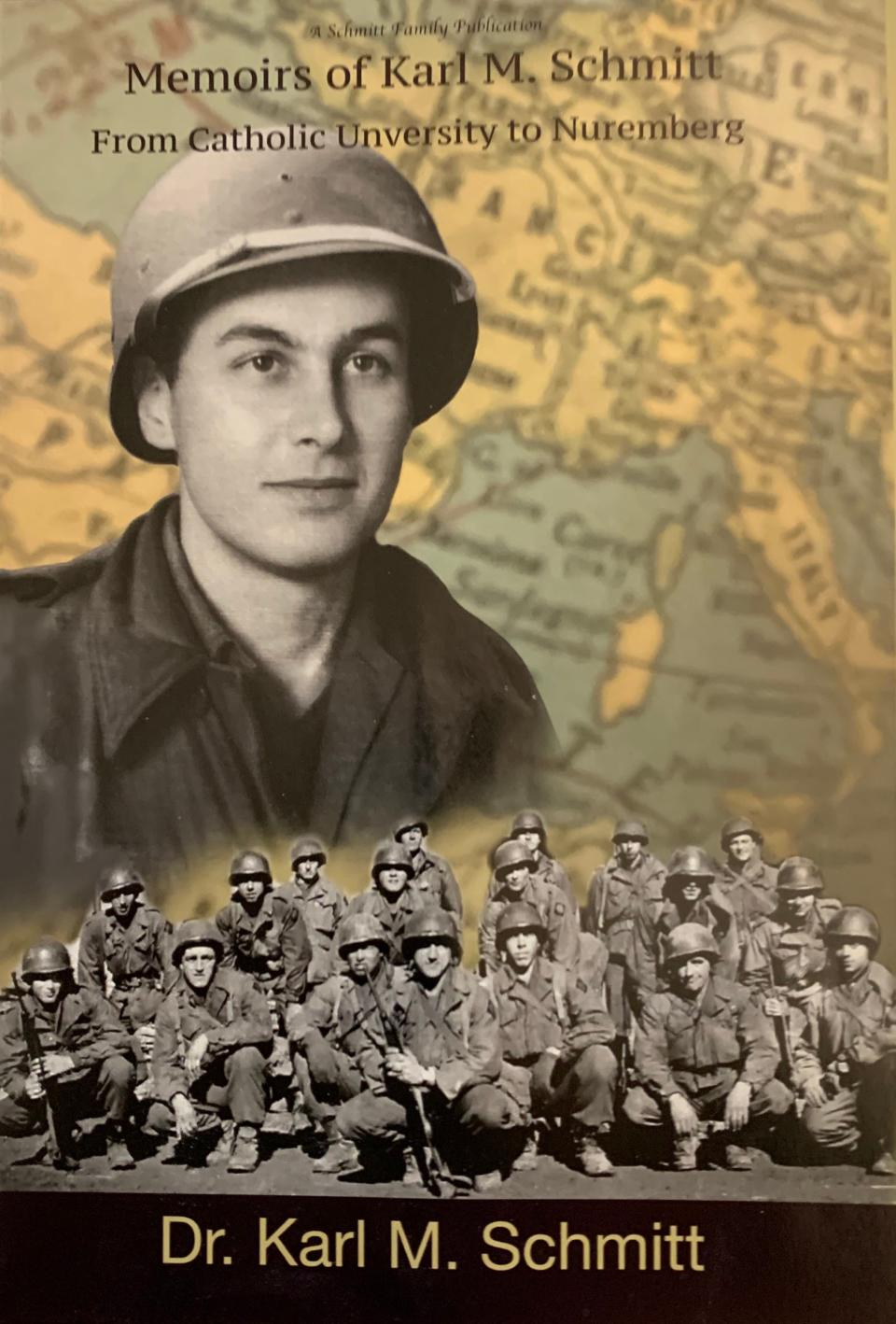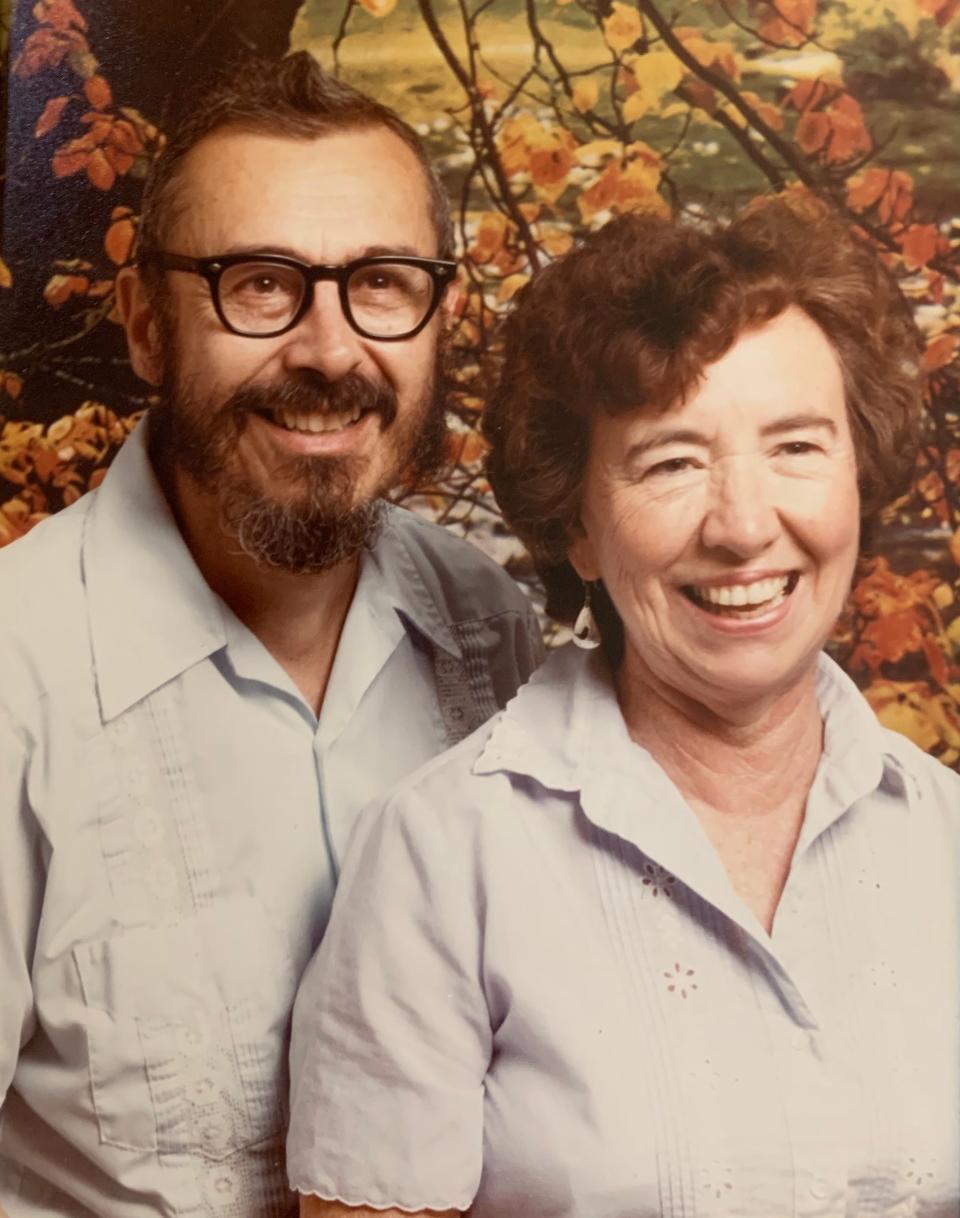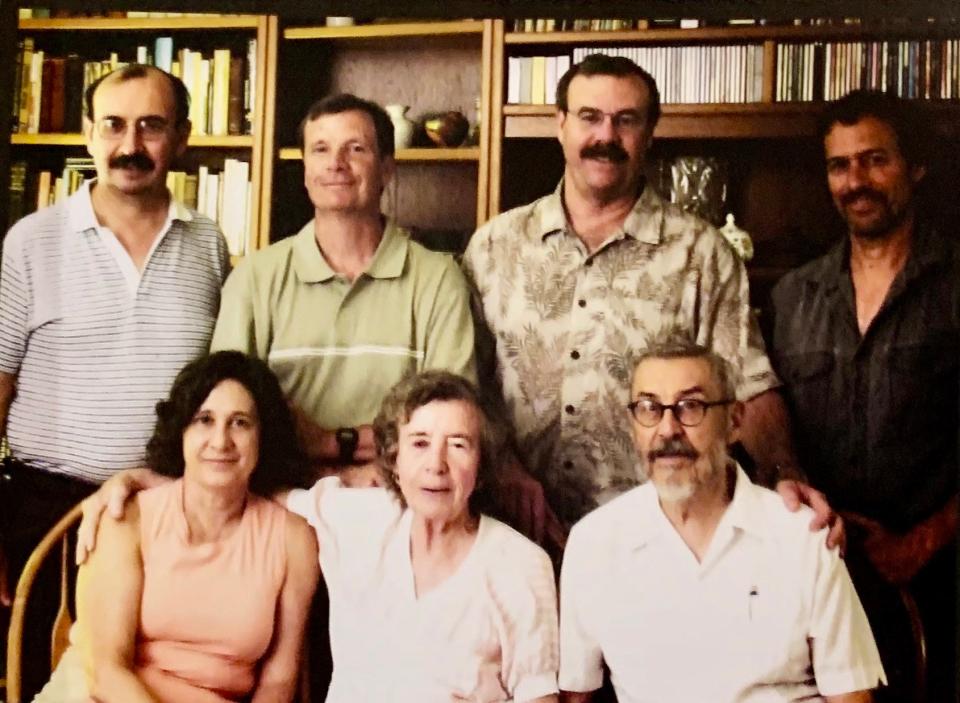'I'm a survivor': Austin WW2 vet Karl Schmitt has packed a lot into 100 years
After tromping through Italy and France — hauling heavy stacks of ammunition, crawling through battlefields, and being pulled from his company for months because of unhealed frozen feet — Karl Schmitt confronted mortality on Jan. 8, 1945.
The Austinite, who turned 100 in July, lost his sense of composure during a bombardment near the Moder River in Alsace, France, when a piece of shrapnel tore into his foot.
"What unhinged me was my first wound," says Schmitt, honored with two Purple Hearts during World War II. "You no longer feel invulnerable. This is common to many soldiers. It's a different psychology: You are no longer sure of yourself anymore."
After that, he and his commanding officer felt it might be time for him to leave the front.
Yet after thinking it over, Schmitt changed his mind, and stayed with his company of "dogfaces" — everyday soldiers who rarely tasted the heroism of war, but did what needed to be done, despite month after month of hardship.
"I was never scared again," Schmitt says at his northwest Austin senior home. "I felt fear, but I never worried about it."

Lessons from 100 years of life
During his long century of living, Schmitt has been many things: son, brother, student, soldier, husband, father to five, University of Texas professor for 30 years, a Catholic whose faith has not wavered.
A devoted Latin Americanist, Schmitt is still treasured on the UT campus, even though he retired in 1988.
"I think Karl is an extraordinary human being," says Adela Pineda Franco, director of the Teresa Lozano Long Institute of Latin American Studies at UT. "I am amazed by his unpretentious character, his earthly vitality, his joy of life, and his relentless intellectual curiosity. I have met very few people who can reflect on his lifetime with such a sense of honesty as Karl. His great sense of humor makes it a real pleasure to talk to him."
I can attest that, after several interviews — and a trip to a military museum together — Schmitt has lost none of his pep. He glides through the halls of his senior residence with the help of a fleet and nimble cane. His talk is filled with laughter, insights, old stories and some of the latest news.
"He is also a great conversationalist and asks lots of question," says his son Michael "Mike" Schmitt. "He may end up interviewing you — just kidding — sort of."
More:'Very old Texas': Musician Monte Warden traces his family back to before Austin was Waterloo
Along the way, Schmitt has written a 600-page unpublished memoir. I have read the war chapters. They are riveting.
Not because Schmitt tells tales of derring-do, but exactly the opposite. He records the daily life of an infantryman — he never rose higher than private first class. And he does so with scrupulous integrity, indicating exactly how he does — or does not — know a particular detail about his time in the military.
"I wrote what I know and what I don't know," he says. "Some people say that's boring. But I want to be crystal clear about the facts. That's the historian in me."
Since the 1990s, without a computer or the internet, he has done a mountain of research, checking service records in federal archives and combing the memories of his buddies from Company K of the 180th infantry regiment.
In 1998, he took an unhurried "war trip" to Europe with his late wife, Grace, and a war buddy to see the sites of his company's landings, battles and bivouacs.
Schmitt seems to have lived several lives. The World War II chapter, however, remains among the most powerful.
"Just don't make me out to be a hero," Schmitt insisted. "I'm not a hero. I'm a survivor."
Before the war, a boy who was good at school
Karl Schmitt was born July 22, 1922, in Louisville, Kentucky, of a German-American father, Edward Peter Schmitt, and an Italian-American mother, Mary Ann Iula Schmitt, both Catholics.
His father, the youngest of seven, had only seven years of schooling. He worked as a messenger boy and then as a clerk at the local L&N Railroad freight office.
"He was bored out if his mind," Schmitt says. "Intelligent, he should have been educated through his whole career."
The floor of the family house sagged like an old horse. A coal stove heated it. With an annual income of less than $2,000, however, his father provided a decent middle-class life for his family of five in the German-American district of Off Center.
"I suspect my Italian grandfather helped us out a bit," Schmitt says. "He owned a wholesale produce business. He migrated to the U.S. at age 12, landless — and illiterate in two languages."
More:'They changed how the city was built': TxDOT keeps immigrant cemetery near I-35 intact
In 1933, the family moved up in the world when they purchased a house in the middle-class Highlands neighborhood for $4,000.
Education lifted the Schmitt family. Karl had two younger brothers, Edward Jr. (1925-2010) was a corporate supervisor, while Joseph Michael (born 1930), earned his Ph.D. in chemistry and worked as a research chemist his whole career.
"I suppose I was a nerd in school," Schmitt says. "I was always a good student, but not at the top of the class. At times I thought I would be an athlete, but I was a bomb."
He attended Catholic schools — St. Martin's, St. Francis Assisi and St. Xavier High School.
"I graduated in the class of 1940," Schmitt says. "Our 60th reunion was the last. There might be three or four of us left. I just checked recently. When you think about it, they are all 99 or 100. None younger."
With the help of the Xavarian Brothers, the teaching order that ran his high school, Schmitt attended the respected Catholic University of America in Washington, D.C.
"I thought of becoming a brother," he says seriously, then laughs, "but I like girls."
Schmitt studied American history and chose Latin American history as a subfield while he held down two jobs and kept up a B average. He also acted in college theatricals.
"I knew I wasn't good," he says, "but I enjoyed it."
A historian looks back at the war he fought in
The war came to the U.S. on Dec. 7, 1941, when Schmitt was a sophomore.
"I knew I was going to be called up," he says. "So I enlisted in the Army Reserve in the summer of '42 and took another semester while I waited."
Schmitt went through basic training at Fort McClellan in northern Alabama, then finished up training at Camp Rucker in southern Alabama.
"It was a hell hole," he recalls. "We hiked fully loaded 10 miles every day in the August heat. Then there were those damn sandflies."
Schmitt's troop ship sailed out of Norfolk, Virginia, on Sept. 3, 1943. His company spent two weeks in Bizerte, Tunisia, before heading to Naples, Italy, which had already been taken by the Allies. In the interim, Italy had surrendered on Sept. 8, so the peninsula was defended by battle-tested German troops.
More:3 history books that help us better understand the Texas-Mexico link
On Oct. 30, 1943, Schmitt was sent to the front, situated at the town of Venafro, Italy, which, in one of the crazy coincidences of his life, lies just 12 miles from where his Italian grandmother was born.
Schmitt dragged heavy machine-gun ammunition through the mountains. In November 1943, his feet froze.
"I was told by an aide to bathe them in hot water," he recalls. "So I did. I filled my helmet with drinking water and heated it with a Bunsen burner. Instead of helping, it got worse. I couldn't walk and came down the mountain on the seat of my pants."
Schmitt had developed "foot rot" and was sent to a hospital in Oran, Algeria, for more than three months.
Not long after that, his company was sent to Anzio, site of one of the last big battles in Italy.
"By the time I got there in mid-March, it had gotten bogged down," he said of the flat Italian coastlands pinned in by mountains and well-entrenched German troops. "At noon on May 26, 1944, we went over a rise right at the Germans with only the grain in the fields as our cover. Bullets flew over our heads. It was the closest I came to a World War I-style 'over the top' moment."
It turned into the worst day for casualties among Company K of the 180th Infantry.
Still, helped by the Texans of the 36th regiment and their "Breakout at Anzio" — a clever sneak attack through the mountains — the Allies soon took Rome. Schmitt's regiment didn't go into the "open city," left uncontested to preserve its ancient treasures.
More:Just before D-Day, 'Texas Army' triumphed in Italy
Next, Schmitt's regiment was transferred back to southern Italy to train for an amphibious landing in southern France. By now, he had switched from the machine gunners to become a mortar man. He carried 60 mm mortars, which measure about 2 1/2 inches, and he could lob them accurately. "I got pretty good at it," he says.
His regiment landed in France on Aug. 15, 1944. They were part of a third wave of Allies and didn't see much action on the coast or heading up the Rhone River valley.
"The Germans were retreating rapidly," he says. "After all, the Allies had already landed at Normandy, and the Germans didn't want to get trapped. For a month or so, it was very light going. It was a piece of cake until we arrived in Épinal (France). By then, the Germans had stiffened and straightened out their lines."
In October 1944, Schmitt's regiment crossed over into a heavily wooded area of Germany proper. They were surrounded by German troops and fought their way out, which earned them a Presidential Unit Citation.
"One night in the bitter cold with a stream nearby, a German tank rolled up," he recalls. "We heard the German commander give the order to fire and a huge ball of fire came out of the mouth of the cannon. We couldn't see them and they couldn't see us. We jumped into the freezing creek with only our heads sticking up. The Army did one good thing after that — they gave us blankets."
Schmitt received his first wound — the shrapnel near the Moder River while he was spotting a machine gunner. The second would came under sniper fire near Nuremberg, Germany. (Another coincidence: His German cousins lived some 20 miles away.)
"The rifleman was behind me to the right," Schmitt says. "The shot glanced off my shoulder blade and went through my left arm."
Still, he resists the word "hero."
"I did nothing to deserve that title," he says. "The two guys who helped me get out of sniper fire could be called heroes."

Husband, father, professor and beyond
After the war, Schmitt earned his bachelor's and master's degrees from Catholic University, then his doctorate from the University of Pennsylvania, an Ivy League school. He studied at first the interaction between the U.S. and Spain in the borderlands, then the Catholic Church in mid-19th-century Mexico.
"The professors at Catholic University threw me out," he jokes, "saying, 'You've heard everything we have to say.'"
His college roommate after the war was a younger veteran, Harold McDonnell.
"A hotshot fighter pilot with captain bars," Schmitt remembers. "We did not get along at first, but became the best of friends."
In fact, Schmitt attended McDonnell's wedding on Dec. 27, 1947. Schmitt was seated — on purpose, it turns out — at the same table as Grace Leary, a librarian from Brooklyn. They married June 18, 1949.
More:'Triumph and Tragedy': Austin-made documentary series scopes out LBJ's legacy on CNN
Schmitt's first teaching job was at Niagara University, a Catholic school in Niagara Falls, New York. He taught there for five years and completed his Ph.D. at Penn in 1954. His mentor at Penn, Arthur Whittager, flagged him for a job in the State Department, where he worked for four years on intelligence surveys of Latin American countries.
"I was not a spy," he says. "Most of this kind of intelligence, however, is classified. Some of it comes from open sources, then knowing how to interpret it."
Sometimes, his research into something like the old constitution in Cuba, which the CIA financed, was classified because "Langley said: We don't want the Russians to know how good — or bad — our analysts are."
His most important paper tried to predict the possible outcomes of the Mexican elections of 1958.
How Schmitt ended up at UT in 1958 is a story unto itself. He was still at the State Department when he received a letter from retiring Professor Lloyd Meacham asking if he would be interested in teaching government, not history, in Austin.
"Some on the East Coast said: 'You don't want to go to Texas, that bastion of anti-intellectualism,'" Schmitt says.
UT had earned that reputation in the 1940s when, not for the first or last time, Texas politicians and regents interfered with academic freedom as well as the hiring and firing of faculty, pitting them this time against President Homer Rainey.
Without a campus visit, and after only one face-to-face interview held at the Army and Navy Club in Washington, D.C., he was hired.
"My main reason was to be near the Latin American collection," he says about the library now called the Nettie Lee Benson Latin American Collection, widely considered the best of its kind in the Americas, named after a longtime librarian and history professor. It was based on the vast Genaro García Collection that UT had purchased in Mexico City in 1921 after the Mexican government reportedly expressed little interest.
Schmitt taught American government and U.S.-Latin American relations. "I liked teaching American government," he says, "learning as I went along."
During his 30 years at UT, Schmitt wrote a number of books and articles. The first book, "Evolution or Chaos," looked at politics across Latin America, supported by material from the State Department as part of its Alliance for Progress campaign. His second focused on communism in Mexico.
He rose to the position of chairman of the government department, but campus politics left him with considerable disillusionment. It was not just the perennial pitched fights between theorists and other scholars, but also personal politics involving a dean who wanted to run the College of Liberal Arts like a business.
"I burned out," he says, "for a variety of reasons."
While he worked on his memoir in retirement, he backed local environmental groups and traveled the world.
"When I finished the military memoir, then I went on to the family history," Schmitt says.
His wife, Grace, suffered a stroke and seizure in 2004 from which she never fully recovered. She died in 2012.

He did not write much about his five children in his memoir.
"I'm not objective about my children," he says. "I'm proud of all of them."
Karl Michael Schmitt is a neurosurgeon who teaches at the UT Medical School in Houston. Edward Joseph Schmitt is a retired pediatrician married to an anesthesiologist. Barbara Schmitt Poer earned a B.A. in sociology and has spent her career in human resources.
William Patrick Schmitt is an artist with a framing shop in Santa Fe. Michael Peter "Mike" Schmitt earned a Ph.D. in microbiology and works for the FDA, as does his wife. "They met over the test tubes," his father jokes.
Schmitt remains a practicing Catholic.
"I recognize its problems," he says.
All of his children and grandchildren have left the church, he adds. But still, he says, they continue to act out the values that have guided his own long life.
Michael Barnes writes about the people, places, culture and history of Austin and Texas. He can be reached at mbarnes@statesman.com.
This article originally appeared on Austin American-Statesman: Austin's Karl Schmitt, 100, looks back on life at war and in peace

